#opinions on writers
Explore tagged Tumblr posts
Text
Vladimir Nabokov’s Brutally Honest Opinions on 63 of the “Greatest” Writers to Ever Write (1973). I got this from a literature FB group; I can’t verify its authenticity. Even if the source is authentic, it seems to me a very subjective exercise, so take it in that spirit.
Auden, W. H. Not familiar with his poetry, but his translations contain deplorable blunders.
Austen, Jane. Great.
Balzac, Honoré de. Mediocre. Fakes realism with easy platitudes.
Barbusse, Henri. Second-rate. A tense-looking but really very loose type of writing.
Beckett, Samuel. Author of lovely novellas and wretched plays.
Bergson, Henri. A favorite between the ages of 20 and 40, and thereafter.
Borges, Jorge Luis. A favorite. How freely one breathes in his marvelous labyrinths! Lucidity of thought, purity of poetry. A man of infinite talent.
Brecht, Bertolt. A nonentity, means absolutely nothing to me.
Brooke, Rupert. A favorite between the ages of 20 and 40, but no longer.
Camus, Albert. Dislike him. Second-rate, ephemeral, puffed-up. A nonentity, means absolutely nothing to me. Awful.
Carroll, Lewis. Have always been fond of him. One would like to have filmed his picnics. The greatest children's story writer of all time.
Cervantes, Miguel de. Don Quixote. A cruel and crude old book.
Cheever, John. “The Country Husband.” A particular favorite. Satisfying coherence.
Chekhov, Anton. A favorite between the ages of 10 and 15, and thereafter. Talent, but not genius. Love him dearly, but cannot rationalize that feeling.
Chesterton, G. K. A favorite between the ages of 8 and 14. Essentially a writer for very young people. Romantic in the large sense.
Conan Doyle, Arthur. A favorite between the ages of 8 and 14, but no longer. Essentially a writer for very young people. Romantic in the large sense.
Conrad, Joseph. A favorite between the ages of 8 and 14. Essentially a writer for very young people. Certainly inferior to Hemingway and Wells. Intolerable souvenir-shop style, romanticist clichés. Nothing I would care to have written myself. In mentality and emotion, hopelessly juvenile. Romantic in the large sense. Slightly bogus.
Dostoevsky, Fyodor. Dislike him. A cheap sensationalist, clumsy and vulgar. A prophet, a claptrap journalist and a slapdash comedian. Some of his scenes are extraordinarily amusing. Nobody takes his reactionary journalism seriously.
Dreiser, Theodore. Dislike him. A formidable mediocrity.
Eliot, T. S. Not quite first-rate.
Emerson, Ralph Waldo. His poetry is delightful.
Faulkner, William. Dislike him. Writer of corncobby chronicles. To consider them masterpieces is an absurd delusion. A nonentity, means absolutely nothing to me.
Flaubert, Gustave. A favorite between the ages of 10 and 15, and thereafter. Read complete works between 14 and 15.
Forster, E. M. Only read one of his novels (possibly A Passage to India?) and disliked it.
Freud, Sigmund. A figure of fun. Loathe him. Vile deceit. Freudian interpretation of dreams is charlatanic, and satanic, nonsense.
García Lorca, Federico. Second-rate, ephemeral, puffed-up.
Gogol, Nikolai. Nobody takes his mystical didacticism seriously. At his worst, as in his Ukrainian stuff, he is a worthless writer; at his best, he is incomparable and inimitable. Loathe his moralistic slant, am depressed and puzzled by his inability to describe young women, deplore his obsession with religion.
Hawthorne, Nathaniel. A splendid writer.
Hemingway, Ernest. A writer of books for boys. Certainly better than Conrad. Has at least a voice of his own. Nothing I would care to have written myself. In mentality and emotion, hopelessly juvenile. Loathe his works about bells, balls, and bulls. The Killers. Delightful, highly artistic. Admirable. The Old Man and the Sea. Wonderful. The description of the iridescent fish and rhythmic urination is superb.
Housman, A. E. A favorite between the ages of 20 and 40, and thereafter.
James, Henry. Dislike him rather intensely, but now and then his wording causes a kind of electric tingle. Certainly not a genius.
Joyce, James. Great. A favorite between the ages of 20 and 40, and thereafter. Let people compare me to Joyce by all means, but my English is patball to Joyce's champion game. A genius.
I. Ulysses. A divine work of art. Greatest masterpiece of 20th century prose. Towers above the rest of Joyce's writing. Noble originality, unique lucidity of thought and style. Molly's monologue is the weakest chapter in the book. Love it for its lucidity and precision.
II. A Portrait of the Artist as a Young Man. Never liked it. A feeble and garrulous book.
III. Finnegans Wake. A formless and dull mass of phony folklore, a cold pudding of a book. Conventional and drab, redeemed from utter insipidity only by infrequent snatches of heavenly intonations. Detest it. A cancerous growth of fancy word-tissue hardly redeems the dreadful joviality of the folklore and the easy, too easy, allegory. Indifferent to it, as to all regional literature written in dialect. A tragic failure and a frightful bore.
Kafka, Franz. The Metamorphosis. Second-greatest masterpiece of 20th century prose.
Kazantzakis, Nikos. Second-rate, ephemeral, puffed-up.
Keats, John. A favorite between the ages of 10 and 15, and thereafter.
Kipling, Rudyard. A favorite between the ages of 8 and 14. Essentially a writer for very young people. Romantic in the large sense.
Lawrence, D. H. Second-rate, ephemeral, puffed-up. Mediocre. Fakes realism with easy platitudes. Execrable.
Lowell, Robert. Not a good translator. A greater offender than Auden.
Mandelshtam, Osip. A wonderful poet, the greatest in Soviet Russia. His poems are admirable specimens of the human mind at its deepest and highest. Not as good as Blok. His tragic fate makes his poetry seem greater than it actually is.
Mann, Thomas. Dislike him. Second-rate, ephemeral, puffed-up.
Maupassant, Guy de. Certainly not a genius.
Maugham, W. Somerset. Mediocre. Fakes realism with easy platitudes. Certainly not a genius.
Melville, Herman. Love him. One would like to have filmed him at breakfast, feeding a sardine to his cat.
Marx, Karl. Loathe him.
Milton, John. A genius.
Pasternak, Boris. An excellent poet, but a poor novelist. Doctor Zhivago. Detest it. Melodramatic and vilely written. To consider it a masterpiece is an absurd delusion. Pro-Bolshevist, historically false. A sorry thing, clumsy, trivial, melodramatic, with stock situations and trite coincidences.
Pirandello, Luigi. Never cared for him.
Plato. Not particularly fond of him.
Poe, Edgar Allan. A favorite between the ages of 10 and 15, but no longer. One would like to have filmed his wedding.
Pound, Ezra. Definitely second-rate. A total fake. A venerable fraud.
Proust, Marcel. A favorite between the ages of 20 and 40, and thereafter. In Search of Lost Time. The first half is the fourth-greatest masterpiece of 20th-century prose.
Pushkin, Alexander. A favorite between the ages of 20 and 40, and thereafter. A genius.
Rimbaud, Arthur. A favorite between the ages of 10 and 15, and thereafter.
Robbe-Grillet, Alain. Great. A favorite. How freely one breathes in his marvelous labyrinths! Lucidity of thought, purity of poetry. Magnificently poetical and original.
Salinger, J. D. By far one of the finest artists in recent years.
Sartre, Jean-Paul. Even more awful than Camus.
Shakespeare, William. Read complete works between 14 and 15. One would like to have filmed him in the role of the King's Ghost. His verbal poetic texture is the greatest the world has ever known, and immensely superior to the structure of his plays as plays. It is the metaphor that is the thing, not the play. A genius.
Sterne, Laurence. Love him.
Tolstoy, Leo. A favorite between the ages of 10 and 15, and thereafter. Read complete works between 14 and 15. Nobody takes his utilitarian moralism seriously. A genius.
I. Anna Karenina. Incomparable prose artistry. The supreme masterpiece of 19th-century literature.
II. The Death of Ivan Ilyich. A close second to Anna Karenina.
III. War and Peace. A little too long. A rollicking historical novel written for the general reader, specifically for the young. Artistically unsatisfying. Cumbersome messages, didactic interludes, artificial coincidences. Uncritical of its historical sources.
Turgenev, Ivan. Talent, but not genius.
Updike, John. By far one of the finest artists in recent years. Like so many of his stories that it is difficult to choose one.
Wells, H. G. A favorite between the ages of 10 and 15, and thereafter. A great artist, my favorite writer when I was a boy. His sociological cogitations can be safely ignored, but his romances and fantasies are superb. A far greater artist than Conrad. A writer for whom I have the deepest admiration.
Wilde, Oscar. Rank moralist and didacticist. A favorite between the ages of 8 and 14. Essentially a writer for very young people. Romantic in the large sense.
Wolfe, Thomas. Second-rate, ephemeral, puffed-up.
https://twitter.com/Essayful/status/1729559047102153008?
6 notes
·
View notes
Text
Tommy basically said "the DSMP was good because it was, and still is, loved" and that basically sums up my feelings on the matter too.
#sure you can talk about the controversies about former members#and how the types of people involved in the writing shaped the narrative in ways that are increasingly troubling to look at#but it was also a project that was and still is loved by many of the (to our knowledge) better people involved#and it inspired so many artists and writers and musicians#people made friends through it#it helped people get through the worst parts of lockdown#my opinion of the dsmp for a while now has been pretty bitter. even when i wanted to remember it fondly it was tainted#and i dont think the worst aspects of the story or the ccs should be ignored#but its also so nice to have the opinion of 'yeah. it was good'#despite everything else there was something worthwhile in the dsmp#dsmp#tommyinnit#okay thats enough dsmp posting in 2024 lmao
5K notes
·
View notes
Text

Stop that right now jimothy
#season 2 episode 5 ‘the apple’#WHY did he do that#Jim’s brand of affectionate exasperation is killing me#I’m sure the writers were going for ‘amusement because he doesn’t need to be told the planet is full of life’#but shatners choice to act as though everything that comes out of spocks mouth is the sexiest thing in the universe#is really adding to the subtext#when I say adding I mean piling on that queercoding with a wheelbarrow and shovel#Star Trek#Star Trek tos#my art#shitpost#comic#sketch#doodle#james t kirk#Spock#spirk#fanart#side note i drew Spock so cute here in my personal opinion oh my LORD
291 notes
·
View notes
Text
i do wonder like. had a black writer written it how would it go. what would be different etc. we are still lacking that perspective. cause we have still not had a dw episode written by a black writer who did not have a white cowriter.
#i should remake my dw writers and directors spreadsheet and add sja and torchwood#dw spoilers#dot and bubble#dw#not bonff#ari opinion hour
617 notes
·
View notes
Text
Law is a lovable character. But I think it blinds people to his flaws.
If Kidd's defeat is considered karma for his bad decisions and bad leadership, the same applies to Law. In fact, in some ways, Law did worse than Kidd. Heart pirates were the least prepared for the race to claim One Piece.
Without Law, Heart pirates had no name and no face. It wasn't because they worked as a team, I think Law intentionally kept them under a veil of protection. His appearance contrasted the rest of his crew mates. He pulled the world's attention towards solely himself, perhaps so his friends could mix within the crowd as civilians when he's gone.
Similar to Luffy, Law wasn't particularly looking for strong people. Now take Usopp as an example. He was a regular village boy with great sharpshooting skills. Roughly, he had the same starting point as Penguin and Shachi, but now he's leagues above them bounty and achievement-wise. Straw hats' journey had a clear aim to be the very best, each of them faced the worst adversaries and grew. Penguin and Sachi, on the other hand, spent over a decade with a Captain who they believed was aiming for a great treasure, when in reality, the Captain was stuck in his own world. He was fighting a lone battle with his friends completely left in the dark.


The lack of transparent communication weakened the crew's foundation. They were sheltered by an overprotective captain, it stunted their growth. In fact, it was simply dishonest of Law to lie about his ambition.

Law's detailed background wasn't decided back then, I think we can overlook this one. When Oda drew the panel above, I'm pretty sure Law in his mind was a much more grey character.
Kidd pirates knew what Kidd wanted. They joined their Captain's reckless adventures willingly and gleefully, Kidd never let them feel like a burden. Zoro and Killer could fight beside their captains on the rooftop, but Bepo - a polar bear mink with a great potential - wasn't ready to be there.
Law realized his goal to claim One Piece only a few days prior to leaving wano, and instead of taking time to grow as a team, he marched ahead to join the flow. I don't think he had many options, but it doesn't hurt to acknowledge his shortcomings.
At the end of day, Blackbeard can't be blamed for playing the game like a pirate. The fault was Law's. His crew was trained to tame the depth of the northern sea, not to find their place in a titan's battle royale.
#im sorry if the ramble is incoherent - I think I'm on a writer's block;;#had to ramble a bit bc I'm seeing a lot of comments comparing kidd and law#I think it's an unpopular opinion so feel free to share your thoughts#one piece meta#one piece#trafalgar law#eustass captain kidd#eustass kid#one piece Bepo#heart pirates#kid pirates#straw hat pirates#monkey d. luffy#usopp#roronoa zoro#one piece killer#mine#op meta
409 notes
·
View notes
Text
racism in star wars will have wikis saying shit like "this species that is inspired on a real life non-white people is just too stupid to use the Force"
#hm i should make an original post tag#yes this is about tuskens#they 'lack mental capacity' to be jedi. according to some writer#which is fucking ridiculous#they have enough mental capacity to have two languages (spoken tusken and tusken sign language)#(they are usually seen being used together but they can be used independently)#just because they're nomadic and hostile to colonizers doesn't mean they're stupid. or lack the nuance to understand good and evil.#in me opinion there may not be any tusken jedi but for the same reason there's no bardottan jedi - they have their own force culture#they are hostile to outsiders and defensive of their people‚ of course they wouldn't let some foreign order take their children away#i think a force-sensitive tusken would be highly regarded in their tribe. being one with the universe is a special privilege.
680 notes
·
View notes
Text
Growing up Vietnamese means that child me was forced to be ok that our origin myth is literally a dragon marrying a woman/fairy/goddess and then divorcing and splitting custody of their 100 kids (lol what)
What I'm trying to say is I've been brain rotting about dragon!Sylus for the past week and it's getting bad and I will only be ok once I write a dragon AU that has a lot of
Overprotective Sylus
Berserk Sylus that can only be calmed by MC
MATES FOR LIFE MORE SOULMATES SHIT
"I belong to you and you to me."
"I would let the world burn for you."
Egg laying 🙂
More dad Sylus because it makes me sob and yearn so badly pls send help
Even more grossly in love with you Sylus because I plan on contributing to this genre until I die 🫡
Really just lowkey need more Sylus worshipping MC like the goddess that she is type of content
"My queen" is going to make a comeback fr fr
I also lowkey want to write MC as a literal goddess and Sylus is just a lowly human who worships at her altar the altar is my hips but this something for another day maybe
"You've sealed your fate the moment you have harmed her."
Literally I just want berserk Sylus decimating the world for one woman is that too much to ask 🥺
Powerful man who rules over others and is feared and revered 🤝 the one woman who rules his heart and can bring him down to his knees
did I mention more soft Sylus It heals my soul in a godly way 🥹
idk if this seed will sprout into anything since I only have the ✨️vibe✨️ for it and not an actual plot lol 🫠 ok bye back to the other 38299272793 wips that I am a slave to
#love and deepspace#love and deepspace sylus#love and deepspace x reader#sylus x reader#x — fanfics ⋆ wips#hi i just woke up after sleeping away half a day#so this is my very lucid thought and decision#i should also mention i've been wanting to rewatch miss the dragon#it has the potential to encompass everything i want#if the writers didn't make certain decisions#but i still adore that c drama idc that it has polarizing opinions#what am i yapping about
286 notes
·
View notes
Text
To specify (because there is a character limit in polls), I am asking if it’s okay for consumers of your work to leave comments with criticism of the show and also if you are okay with people leaving comments with constructive criticism of your work
If you can, specify what type of creator you are in the tags!
#I have seen a lot of opinions on this matter#and I want to know what the general consensus is#no other purpose to this but my curiosity#but that is certainly reason enough for me to make a poll#also#use your own discretion for these answers#if you aren’t sure if you’re a creator#or you aren’t sure if your opinion is nuanced#or for or against#just choose what feels right#reblog for a bigger sample size#please!#miraculous ladybug#mlb#miraculous#ml#ml fandom#ml writers#ml artists#ml polls#my polls#poll
503 notes
·
View notes
Text

LUMINESCENT SEED
A seed from an unknown flora. It is small and vibrant, emitting feelings of reassurance and gratitude. The seed resonates when near Witness-created hands found in the Pale Heart.
#destiny 2#destiny the witness#the witness#the final shape#gameplay 10/10#story western writers/western audience#(not played raid or excision but doubt my opinion would change)#that's all i will say on this blog#anjiandraws
423 notes
·
View notes
Text
Must read. Here' s a snippet to motivate you :
For the still-not-convinced: If you need an AI to come up with ideas for you, you don’t even belong in the fucking room, because ‘coming up with ideas’ is literally the most basic level skill to have. A basketball player who can’t dribble doesn’t belong in the NBA, so why the fuck do you think you deserve a spot on my writing team if you need a computer to do what any goddamn fucking eight year old can do? Take the fucking hint, you fucking fraud: if you need AI to do the most basic tasks required of you as a writer, then you aren’t employable as a writer. Period. Fuck you. You’re a waste of everyone’s time.
#AI#writing#art#ai art#ai writing#opinion piece#it's good#read it#recommended#writers#artists#chat gpt#creative writing#anti ai#ai scam
2K notes
·
View notes
Text
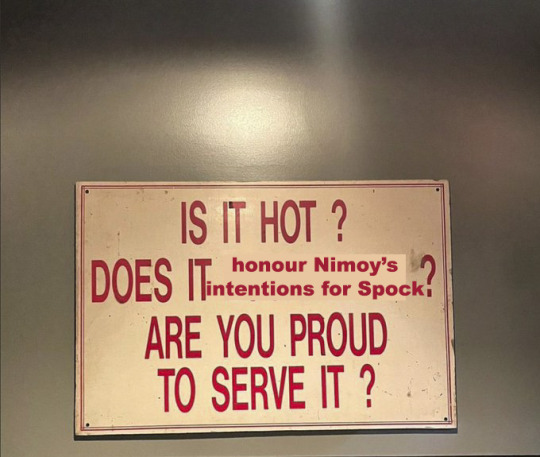
sorry I'm not a photoshop master but would someone mind hanging this up in the SNW writers' room because I think we have all had enough
#Nimoy's portrayal of Spock is INTENTIONALLY Jewish coded and visibly queer coded#you can claim ignorance as a casual fan but as a writer it's your JOB to know and honour this shit#SNW has done ok with autistic coding of Spock but the erasure of the other stuff feels deliberate at this point#like cishet white nerd men want him to be like them so they make these bizarro choices that feel like a totally different person#sorry but he's not FOR you#he was NEVER for you#you already have everything else please just let him be the way he was intended to be#let us have one gd thing#why are the opinions of people who don't care about Star Trek's ethics and legacy more important than the opinions of the those who do#star trek#strange new worlds
3K notes
·
View notes
Text
Jazz wasn't crazy. People might argue that burning her childhood home to the ground with her parents still inside would be an indicator of insanity. But how else was she supposed to react after coming back home from college to find out her parents had brutally killed her brother via vivisection?
Dying her hair blonde wasn't crazy either before anyone asked. Plenty of girls dyed their hair when they needed a change. Besides, she could never live with herself if she kept the same hair color as that vile woman.
Admittedly Jazz would have to secede moving to Gotham had been a little crazy but it was the perfect place to start fresh and blend in despite her "quirks". She had even picked out a nice new identity for herself.
Clearly Jazz was not crazy as she had managed to land a job at Arkham Asylum as a psychiatrist. If she were really insane would they have ever hired her? No they wouldn't have.
Jazz was not crazy. She was very much sane. Just like her precious Mr. J.
#dp x dc#dc x dp#dpxdc#dcxdp#hyper prompts#winter's tales#not sure which one this fits under more#surprise! jazz is harley quinn#do not ask me how my brain concocted this for i truly have no idea#i was merely as vessel for my own crazy thoughts in this case#btw y'all i tried to look up whether harley was a psychologist or a psychiatrist because i couldn't remember#and i got conflicting answers#i think the general consensus is she's a psychiatrist who acts like a psychologist#because most writers don't know the difference#and by general consensus i mean i saw a total of one source that had that opinion#but it makes the most sense to me so i'm running with it#the same source (reddit) as theorized that she's a double major#which also makes sense because even in her origins she's studying psychology#but she's also going to med school!?#hello??#you don't even need to be an expert or anything#just open a dictionary!#look it up on google!#something!#anywho#her job switches depending on the era comic run writer etc#you know basic comic book shenanigans#sorry for the rant y'all#it was just so mind boggling that it actually became a little funny#so i thought i'd share
969 notes
·
View notes
Text
Things that immediately turn me off a fiction book
I'm pretty picky with what I read, because the time I spend reading is time that I could spend writing. I generally know if I will like a book within the first chapter, and I feel no shame in giving up if I'm not vibing with it.
And no, I don't believe in the "oooh read further it warms up" because does it? Does it really? Do I want to waste time finding out?
Frankly, at this point in life, I read more nonfiction than fiction because there's just so. many. bad. books. that are getting published. Worse than fanfictions.
Anyway, here are the things that make me give up. Maybe hearing this will help you as you write your own masterpiece.
Too Many Proper Nouns
Three characters maximum in the first chapter or two. Do not throw dozens of people at me. I will get confused and give up. Let me get to know the main character, by themself or with a few of their closest companions, before you make me remember everyone else. And go deep with those characters! I want someone to stick with!
You can reference other characters, to create a sense of a deeper world, but do not go all-in on them. Make it clear that they are just there to provide a bit of context, and we don't have to remember them yet. We should only be meeting three characters maximum.
Throwing Us Immediately Into a Dramatic Action Point
This is controversial I know, but I hate when something immediately starts with a battle. I don't care if any of these people live or die. I don't know them. I haven't grown attached to any of them.
Even just a page or two to get to know them first will help. You can have them gearing up for a battle, thinking about what's going to happen, maybe talking to their friends, maybe checking their armor, whatever feels natural for them. But do not just start with stabbing people! I don't care about them yet!
Too Many Details
Many this is just me, but I simply do not care about every piece of armor your character is wearing. I don't need to hear a play-by-play of every single color of every single thing because I don't care. Pick out a few specific things for me to focus on and that's it. Stop overloading me with colors and patterns and armor styles.
Yes, yes, you've done your research on historically accurate gear. That's great. It would be good for a movie. But if I have to look up different armor pieces every five seconds, I am glossing over it and moving on. I don't care. I'm here for the story. If I wanted an infodump about medieval armor, I would simply pick up a nonfiction book (and maybe I will).
White Space Syndrome
Tell me what the overall scene looks like instead of all these hyperspecific details of certain objects, like carts or emblems or whatever. I want to know where I am!!
Don't just say "a forest." Tell me what kind of forest. Tell me if it's a young forest or an old snarly forest or a swampy forest or a cold alpine forest.
Don't just say "a castle." Tell me if it's a bustling castle or a gloomy castle or a rundown castle.
Don't just say "on the sea." Cold sea? Tropical sea? Far far away from land or is land in sight? These are the things I want!
Too Much Backstory
For the love of god do not explain the entire history of this culture in the first chapter. The first chapter is for getting to know the characters we're going to be following. You can introduce those things slowly and carefully as the story unfolds.
I get that fiction writers are delighted by all the worldbuilding (or research, in historical fiction) they have done. But the reader does not care right away. They need to get invested before all those little specifics matter at all. My eyes glaze over and I give up because I don't want to have to remember all of that all at once. It's like you just threw a college textbook at my face.
Plus, if you're doing third-person limited, you have to remember that the character is not going to be thinking all of that! They won't say all of that either! Because they know all of that!
Even a general on the brink of a major battle is not going to go "yes, this all dates back to when we took Iuanfutila back in 181, when the brave Iuanfutilans protested the rule of our Yawwbaawnwhryr leaders ...." They are focused on the present moment, and they may discuss the backstory later. Tell us what we need to know now because that is what the character would be thinking too.
"Oh, but Topazadine, how will the readers understand the context if I don't tell them??"
There's a battle. Two groups are at war. Or something was stolen. Or two people are fighting. Whatever. We understand those things. We can get the basic gist of how things are going to play out by just showing us these things happening. Then, as we have gotten a feel for the characters, you can tell us more about the context.
If you walk into a store that's being held up by an armed robber, do you give a shit about his backstory, or do you only care once that person has been arrested and you have to testify? I think we know the answer. You're not going "ohhh why is he doing this??" at first. You're going "HOLY SHIT THERE'S A GUN WHAT'S GOING TO HAPPEN NOW???" and then you'll care about the other stuff later.
Too Much Play-by-Play
I also do not need a play by play of a fight scene. I need to know the general movements, and then the overall atmosphere. I want to feel what the character feels rather than feel like I'm watching a football game.
Your reader will fill in the gaps if you give them enough information, but when you overload them with every single action, they're now trying to keep track of what went where instead of how this moment is supposed to feel. And now the action and drama has gone out of the writing because it's become a manual of fighting techniques.
Pointless Dumb Conversations
"Oh, could you turn around for me? I want privacy."
"Sure, of course, I'm a respectable man." Manfred knew that a lady-in-waiting would be unsettled by the presence of a strange man, so he wanted to be respectful.
"Thanks."
"You're welcome."
Oh my god no one cares!!! No one!! We don't need this exchange. Cut it. This is stupid. Unless something is actually happening or something is meaningful about them saying this, shut up.
How to Not Write a Horrible First Chapter That Makes People Ragequit
Can you tell I'm mad today? I started and stopped three different books because they were all so bad.
Three characters max in the first chapter, with deep discussion of each. (One or two is better.) General appearance, demeanor, profession, whatever.
Restrain the urge to infodump! Dribble it out over the chapter!
Give the setting more attention than random little details that ultimately do not matter. I don't need to know the pattern of the curtains on the horsecart that's about to be burnt. Don't care.
Do not give a play by play of every single action that a character takes because it's boring and no one cares.
In media res is great but do NOT start with a big climactic intense battle or fight or whatever because we don't know these characters and don't know who to root for (or why we should care).
Your character is not going to give us a history lesson in why this conflict is happening. Do not do it yourself either. Give us just enough to get intrigued and no more. Think how your characters would think and what they would prioritize in discussions.
If a conversation is just pleasantries and has no purpose, drop it, we don't care.
#spicy writer opinions#writing#writing advice#story writing#novel writing#creative writing#creative inspiration#writers block#fiction writer#fiction writing#fantasy writing#original fiction#writblr#writeblr#writerscommunity#I'm becoming Cerie .... no no no
220 notes
·
View notes
Text
keep in mind that these are stories... that people are writing as a hobby... for free... most times for you to bust a nut...............
#love how nothing on tumblr can ever be nuanced btw#like be nice with your opinions as well? it's ok to disagree? everyone can curate their own experience here?#don't make writers feel bad#tw discourse#v rambles
210 notes
·
View notes
Text
“LIED-ABOUT WARS Advertising campaigns, marketing schemes. The target is public opinion. Wars are sold the same way cars are, by lying. In August 1964, President Lyndon Johnson accused the Vietnamese of attacking two U.S. warships in the Tonkin Gulf. Then the president invaded Vietnam, sending planes and troops. He was acclaimed by journalists and by politicians, and his popularity sky-rocketed. The Democrats in power and the Republicans out of power became a single party united against Communist aggression. After the war had slaughtered Vietnamese in vast numbers, most of them women and children, Johnson’s secretary of defense, Robert McNamara, confessed that the Tonkin Gulf attack had never occurred. The dead did not revive. In March 2003, President George W. Bush accused Iraq of being on the verge of destroying the world with its weapons of mass destruction, “the most lethal weapons ever devised.” Then the president invaded Iraq, sending planes and troops. He was acclaimed by journalists and by politicians, and his popularity sky-rocketed. The Republicans in power and the Democrats out of power became a single party united against terrorist aggression. After the war had slaughtered Iraqis in vast numbers, most of them women and children, Bush confessed that the weapons of mass destruction never existed. “The most lethal weapons ever devised” were his own speeches. In the following elections, he won a second term. In my childhood, my mother used to tell me that a lie has no feet. She was misinformed.”
― Eduardo Galeano, Mirrors: Stories of Almost Everyone
#Eduardo Galeano#uruguayan writer#current events#lied wars#gaza genocide#public opinion#israel war crimes#crimes against humanity#Vietnam#Iraq#Gaza#Chili
265 notes
·
View notes
Text
Thinking about the crazy love triangle situation in Blue Eye Samurai and debating heavily with myself on how I'd like to see it conclude. And yeah this discussion can be thought of purely as shipping, headcanons, and fandom fun. But when analysing the show and engaging with it in a more in-depth, almost-literary level, it's impossible to dismiss who Mizu's potential love interests are and how different endgame romances would affect her character arc and the overall story and themes.
So in this post I'd like to look at the love triangle a bit more closely, and speculate on where the story will take this.
DISCLAIMER: It is my personal interpretation of the text that Mizu is non-binary—I use this as an umbrella term denoting any gender that does not adhere to the binary restrictions, norms, and expectations of what it means to be either a man or woman in a particular society; it's not just an androgynous "third gender" that exclusively uses they/them pronouns. Thus, while I personally believe Mizu is not strictly a cis woman, she does still identify with womanhood, despite definitely feeling a level of detachment from it due to living as a man for so long. With that being said, I will be using she/her pronouns for Mizu in this post, but please note that this is purely personal preference. Everyone is free to interpret the text the way they like. That's the fun of fiction. Now, without further ado, let's proceed.
Okay so, thinking about the pairings on a purely surface level, and even before i got into the show, I was pinning my hopes on some lesbianism going on between Mizu and Akemi, and the show does hint at this; in Ep1, during their first encounter in Kyoto, there is the famous slow-mo shot of their eyes meeting, Mizu's lips slightly parted as she is unable to tear her gaze away from Akemi, while sweet string music plays in the background. This is clear romantic framing, and a marker of attraction. If Mizu was a cishet man, there would be no question that this is a potential love interest.
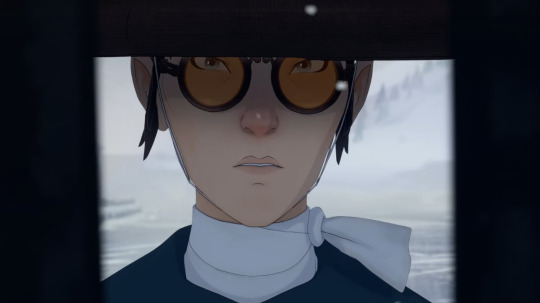
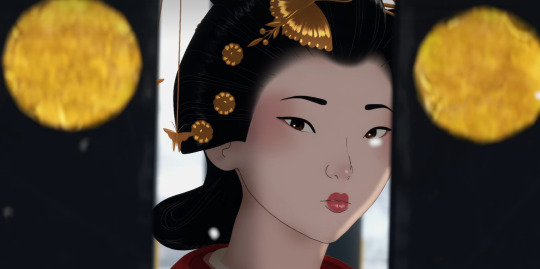
But then, in the same episode, we meet Taigen, who is introduced to us firstly from hearing Akemi's father describe him as "a fierce and undefeated young samurai", the "best swordsman in the best school" and "a fisherman's son from Kohama [...] whose rise reminds [him] of [his] own."
In the next scene, we meet him in person as Akemi's fiance, and he seems sweet enough. He even gives her sweets! In exchange, Akemi gives him gold, and he feels a bit ashamed that he doesn't have anything better to offer her. But Akemi accepts him and his gift wholeheartedly and flirts with him a little, which makes him smile kinda shyly.
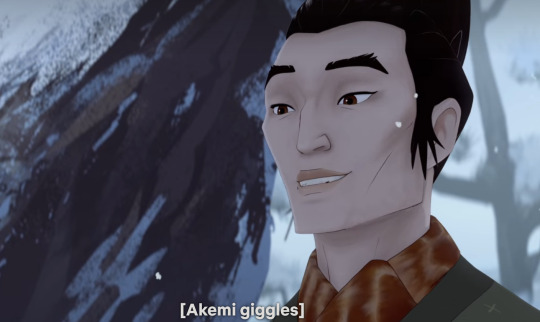
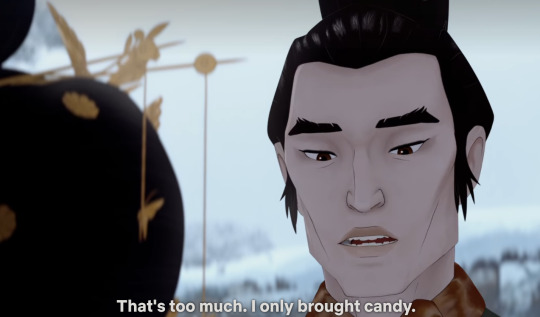
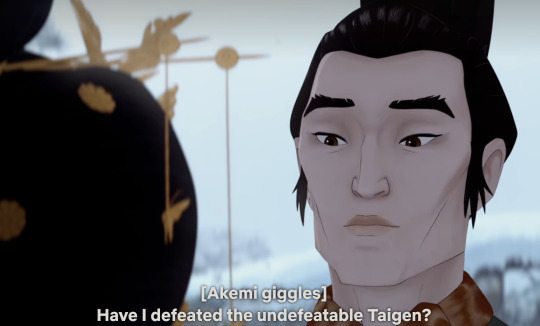
When Akemi confirms their engagement, Taigen is in disbelief because he has no status or noble background, but Akemi reassures him.
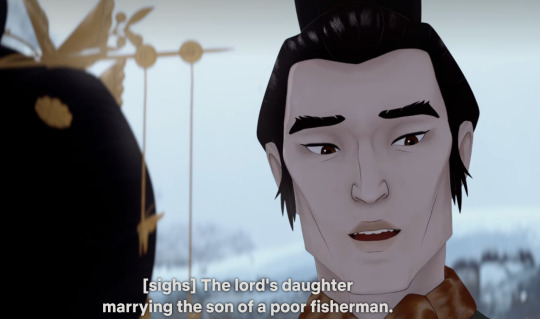
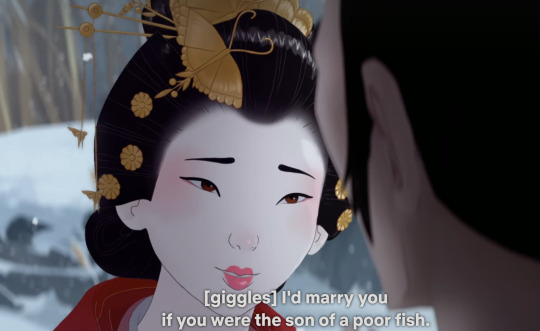
So from these first few scenes, we're introduced to Taigen as an honourable and strong samurai, but also as a man who is sweet and gentle with the woman he is about to marry, as well as aware of his own inferiority when compared to Akemi's high station.
Our view of him then changes as his true self is revealed: he is an arrogant and smug bastard among his peers, but more importantly, he is the terrible bully from Mizu's childhood.
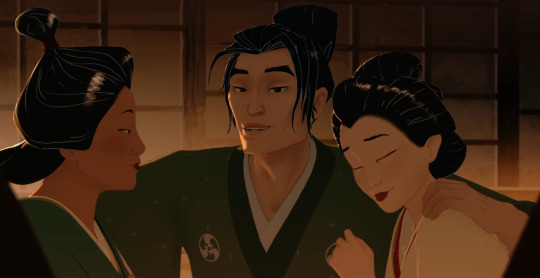
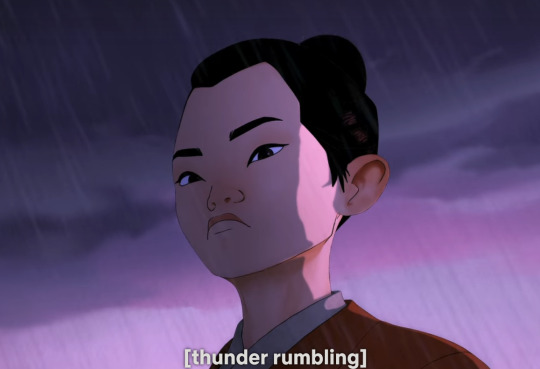
And it is this side of Taigen--pompous jerk and unrepentant xenophobic bully--that we continue to see as the show goes on, and it's safe to say that this is his real self, sans any pretense of humility and modesty. Around anyone who isn't an outright superior in terms of class and power (ie. Akemi's father, the shogun), Taigen never hesitates to assert his own authority and "greatness."

But as the show goes on, he gets caught by Heiji Shindo's men, and then tortured. And that's when we see, okay, turns out he's not that bad. He's honourable; "honour" is not just meaningless and superficial pedantry for him, but an internalised, guiding principle.
He was a cruel asshat throughout Mizu's childhood, but in a prejudiced and xenophobic society, he was just playing by the rules. As a child, he knew he was at the bottom of society, but when met with someone even lower ranked than him (Mizu), he can project all those prejudices and insecurities onto someone else. This way of thinking--"if you can't beat 'em, join em"--is what allowed him to climb up the ranks despite being some dirt poor kid from an abusive household*.
*Well, that combined with his cismale privilege of course, because this would not be an option for a woman in similar circumstances.
Thus, his upholding of honour also exemplifies how Taigen embodies the ideals and rules of his society. His insistence on duelling Mizu is another more blatant example of this. He doesn't want revenge like Mizu does. He wants to be accepted by society, within the bounds that society has placed, and that means that his only two options following his defeat at the Shindo dojo were to either chase Mizu down and get his damn duel, or kill himself for his humiliating defeat.
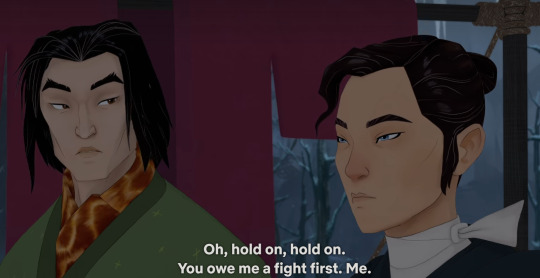
Now! Moving on from Taigen, let's go back to the other end of this little love triangle: Akemi.
Mizu and Akemi only properly meet in Ep4. During their first meeting, when Akemi tries to poison Mizu in Madame Kaji's brothel, she compliments Mizu's eyes, calling them "beautiful."
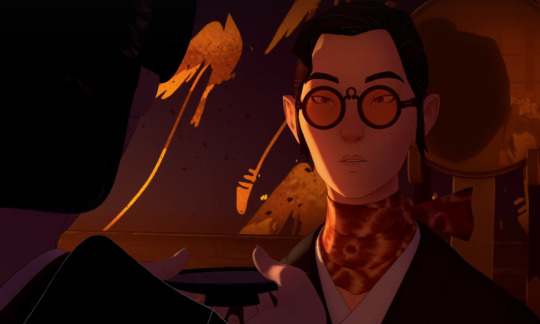
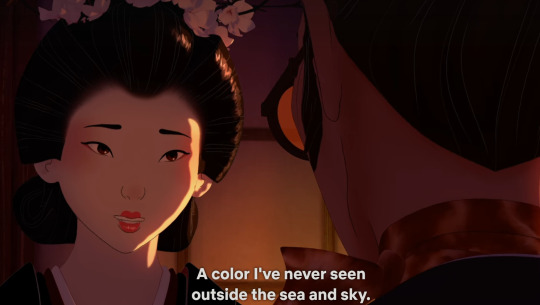
This seems to genuinely take mizu off-guard for a second before she coolly plays along. We know that Mizu recognises Akemi from the get-go, and thus sees through Akemi's ploy from a mile away. It's also safe to assume she'd expected false flattery, because Mizu understands full well that this tactic is how women get what they want: by using their 'feminine wiles' and playing up their naivety and innocence. But even so, it's interesting that Mizu actually seems surprised by Akemi's compliment.
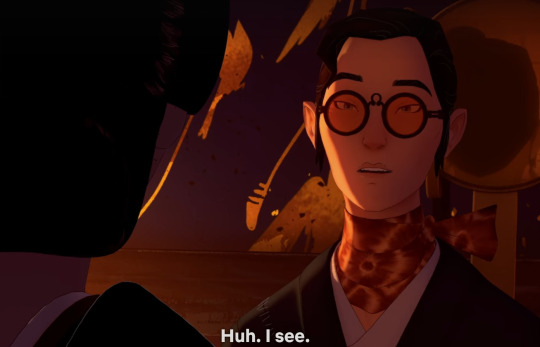
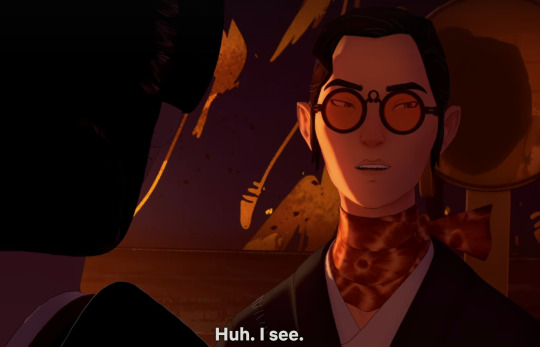
Then, after Mizu subtly taunts Akemi by lying about Taigen's death, she and Akemi have a bit of a scuffle, and then we get to Mizu saying this:
"Women in our world don't have a single good option. Except you, like some magical forest creature. You could have anything you want, but then you beg to eat trash."
(no screenshot because it's quite a long line but you get it)
Here we see Mizu's opinions on the marginalisation of (mostly poor and under-privileged) women stated outright, and underlying her words is also resentment. Because even though she and Akemi have shared experiences of female oppression, Mizu, unlike Akemi, was also poor, from a rural village, and is a racial minority. Mizu is triply oppressed, while Akemi only faces one primary form of oppression, and to someone as embittered by the world as Mizu is, to see Akemi "beg to eat trash" is a slap in the face, practically tone-deaf to the other injustices around her--injustices which Akemi has not shown much, or any, acknowledgement for at this point.
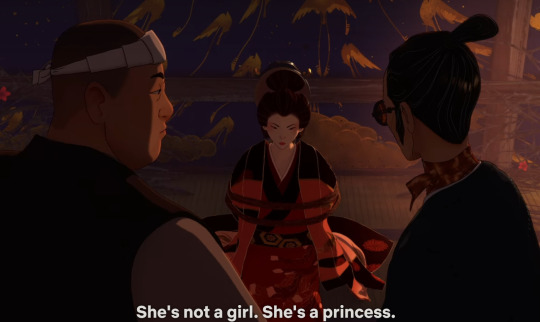
Then, after this scene, Mizu kills Kinuyo, and this unsettles her to a degree we've never seen from her before. She is visibly distraught, and the entire sequence hammers the theme of this episode (and arguably, a large portion of the show) into our heads: women in this world suffer. And even though Mizu is well aware of this fact, to commit this act is so visceral that is shakes her to her core, and it's what ultimately leads to the ambush of the Thousand Fangs.

But before the ambush, Mizu and Akemi talk a little again, and during this time Akemi taunts Mizu some more.
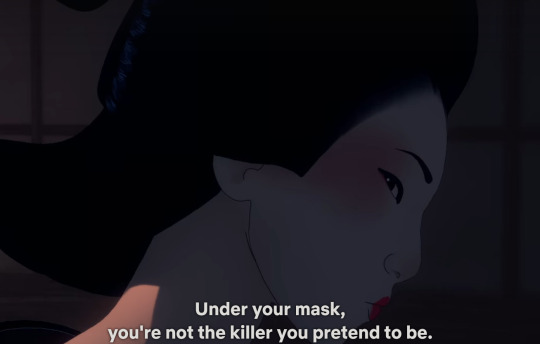
Right now, Mizu is exhausted to the point where (I believe) she even downs some sake, despite not usually drinking. Thus, worn down, she cuts Akemi's ropes and tells her, "Just go." Akemi recovers from her initial fear of Mizu's blade and taunts her some more, accurately seeing through Mizu's facade of coldness, recognising the raw anger there, and says this:
"I thought you had to be something special. Your face isn't even so scary. You're just... angry."
At this, Mizu is amused and compares Akemi to Taigen ("I see why he likes you. You're just like Taigen when we were children. A fucking brat.")
The reveal that Mizu and Taigen knew each other in childhood surprises Akemi, but before either of them can say more, everything goes to shit.
That's when we get to Ep5. This episode focuses primarily on Mizu, the central piece of this love triangle, and does the most out of all the episodes to shed some light on her character and goals, fleshing her out to be more than just the vengeful, highly proficient samurai we've seen thus far (symbolised by The Ronin), but also a person who is capable of love, domesticity and gentleness (symbolised by The Bride). But in the end, Mizu rejects both these ideals, instead becoming an Onryo, who is neither guided by pride/honour, nor love.
By 'reincarnating' into an Onryo, Mizu is able to win the day and save the women in the brothel. However, as she has now fully embraced her status as an Onryo, and is exhausted physically, mentally, and emotionally, she lets the Tokunobu clansmen take Akemi away while Akemi's screams echo in her ear.
Mizu says this choice is for Akemi's own good, that Akemi's better off; because Mizu is jaded and weary, and cannot afford the luxury of idealism, and thus must always be strictly practical and realistic. So of course that's why, in her view, yes, Akemi should not be wasting her time in a brothel where women are exploited and abused, nor should Akemi be so naive to think that her marriage with Taigen is even still possible. However, regardless of Mizu's views, it is not for her to decide, because though Akemi is privileged in some sense, she is still trapped and voiceless, and deserves the right to choose her own destiny.
But as it happens, in the end, though Akemi did not choose who she gets to marry, she DOES get to choose her next move when Edo burns down.
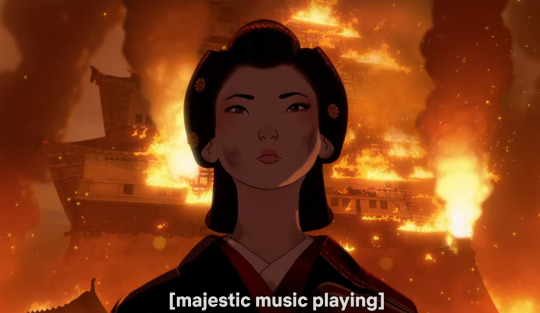
"I want to be great."
This one line is the key to her entire arc, which is only just beginning. We see she quickly has acquired the affection and good graces of the shogun's son after their wedding night and consummation, and with Madame Kaji and the girls now serving her, Akemi will only grow to become a prominent political player.
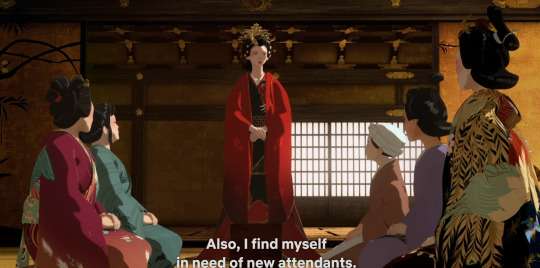
NOW, only after analysing the characters as they are within this season, only can we speculate how their arcs will continue as the show progresses.
First and foremost, I will reassert the popular opinion that Mizu and Akemi are foils. The climax (pun intended) of Ep7 illustrates this as it parallels the turning points in both Mizu's and Akemi's arcs:
Mizu melts the steel of all her loves and shames, the people she's collected: the broken blade wielded by both Chiaki and Taigen, Akemi's knife, Ringo's bell, Master Eiji's tongs - this symbolises her beginning to accept herself, and in doing so, also accepting the help of others;
Akemi consummates her marriage with Takayoshi Itoh, gains his affection, and cements her position as a woman in the shogun's palace - this symbolises her taking charge of her situation, no longer playing the damsel, but using her position to her advantage, empowering both herself and the underprivileged women around her.
These are thus two directly contrasting, diverging journeys:
Mizu's arc moves inward (yin). It is an internal path of self-love and self-discovery, focused on finding peace and tranquility inside herself, and this involves allowing herself to let others into her life, opening herself up to friendship and empathy once more.
Akemi's arc moves outward (yang), it is an external path of growth, transforming from a naive, caged princess to a powerful woman and a force to be reckoned with.
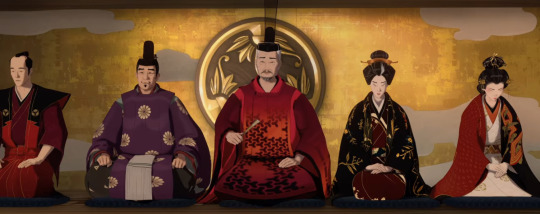
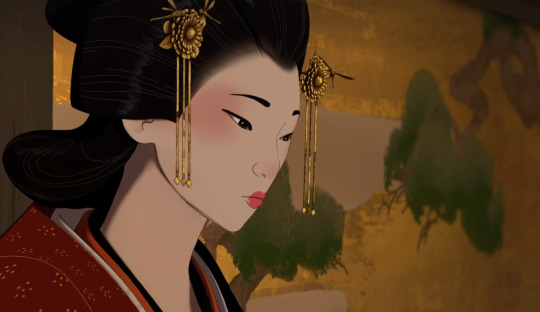
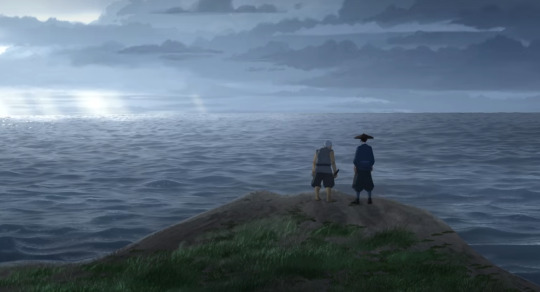
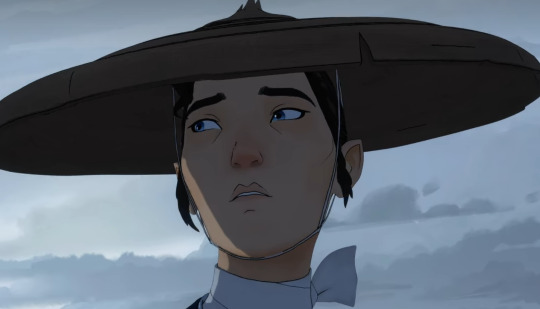
Akemi is always dressed in red, even her eyes are a bit of a reddish-brown rather than brown-black like most other characters, and in her penultimate scene she stands against a backdrop of flames. She is fire: quick-tempered, passionate, full of energy. Red is powerful, authoritative, and in eastern cultures, it is associated with prosperity.
Mizu is blue: her eyes, her sword, her clothes. She is also named after water; it's where she goes to recover, reflect and meditate. Water is fluid like a brook weaving around a stone in its path, always changing and adapting, it is graceful, it is beautiful and ruthless, tranquil yet swift.
Thus, in the future, I expect we will see plenty of political manoeuvring and intrigue in Akemi's plotline, where she fully embraces control of her life, and begins to take action to help others as well, realising that her own oppression is just one piece in a much larger picture. Her main conflict is with society.
In direct contrast, Mizu's main conflict is with herself. She must realise that her desire for vengeance is a projection of her own deep-rooted self-hatred. Her arc must move towards unpacking her feelings and trauma so she can be at peace with herself and allow space for love in her heart. Because as we saw in Ep5, Mizu had come extremely close to achieving peace and joy, as she had not only loved Mikio, but also had briefly believed that Mikio had loved her (and accepted her for who she is) as well.
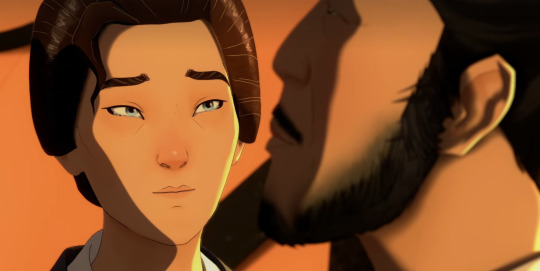
Thus, assuming the story is not planned as a tragedy, Mizu will likely end up getting her vengeance, but it will not satisfy her, because it is not what she needs. What she needs is to let go of the Onryo within her and to reconcile both The Ronin and The Bride within herself, as she is both a fighter and a lover, but not a monster.
(Edit: I recommend checking out this post by @stylographic-blue-rhapsody for a much clearer analysis about Mizu'a symbolism as Ronin, Bride and Onryo!)
And now that we've mostly covered each of the characters individually, we can finally get to the main point of this post: the love triangle.
--
Let's talk about Option A: Akemi.
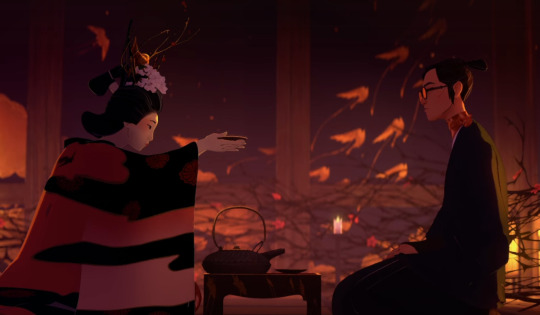
As I covered extensively earlier, Mizu and Akemi are foils, a yin-yang pair. But while they play off each other very well in a thematic sense, I personally believe that a serious romance between them will be more complicated if they become endgame. This is because Akemi's natural resolution is to embrace a position of power and influence, where she has both freedom and control over herself and to make much-needed changes in a prejudiced society. Meanwhile, Mizu's natural resolution is the opposite; her happy ending would to find a peaceful life where she is safe and free from prying eyes, and able to be her true self.
Thus, it would make very little sense for Akemi to forfeit power and run away with Mizu and start a humble life together. Akemi wants to be great, and that is absolutely what she deserves. On the other end of the spectrum, it would also make little sense for Mizu to dedicate her life in service of Akemi, such as acting as a bodyguard or something similar, because a life in a palace full of court intrigue and conspiracies is far from what Mizu needs to be happy.
With that being said, if Mizu/Akemi is endgame, and assuming their overarching character arcs do not shift directions, their love story would likely be either tragic, doomed, or bittersweet. I do absolutely love this type of story because personally I'm a sucker for catharsis, so it would be very interesting if the writers do decide to take this route.
Also, as a note, please do not take this as me dunking on this pairing. This is just my personal opinion and analysis and I completely understand if you disagree!
--
Then, of course, we have Option B: Taigen.
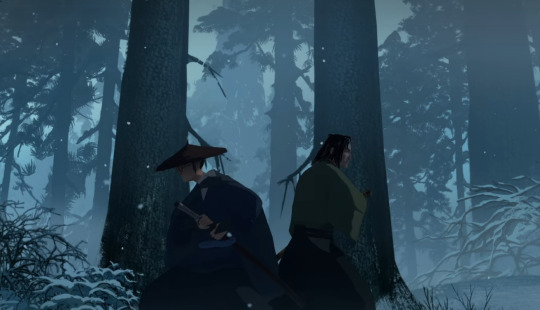
Between Akemi and Mizu, Taigen is a bit of a free-floater here, because Season 1 leaves off at a point where his arc is very ambiguous as to where it's headed. While Akemi climbs for greatness and Mizu goes on a journey across the ocean to (presumably) discover more about her heritage, we have little clues about where Taigen is headed. And if I'm being honest, I'm sure he has no idea either! He still hasn't reclaimed his honour, so he would be unable to rejoin the Shindo Dojo; he's been rejected by Akemi; and while he showed loyalty to the shogun, the shogun is now dead, and all the shogun's men who had witnessed his "humiliating" death were left to die by Lady Itoh, who is now pulling the strings within the palace.
Therefore, Taigen has very few options here.
And when considering his role in the story is as Mizu's begrudging ally, his arc will undoubtedly be focused on unlearning his xenophobia and misogyny, the latter of which we have not seen yet, but is surely present. Now, whether he will do this in Mizu's presence or absence will be unknown until we see Season 2. Following the Season 1 finale, he might return to Kohama and wait for Mizu there as he learns humility and remorse over his past cruelty; or maybe he will follow Mizu to London, and the two of them will continue to butt heads until he finally admits to himself that he cares for Mizu more than he would like to admit. There is no room for doubt that his growing feelings for Mizu are more-than-platonic, because we all saw him get turned on by sparring with her in Ep7 lol. Thus, regardless of the exact choice he makes, I am sure that his overall arc will be focused on redeeming his character.
Now, when it comes go redeeming him, I know there are many who simply don't want him redeemed because he was such a jerk to Mizu, and while yes I agree he was awful, I do believe there is also nuance to his character.
Previously I've discussed in great detail the colour and elemental symbolism with Mizu and Akemi, but have yet to touch on how they relate to Taigen. So, let's talk about that for a second.
While Akemi is red and Mizu is blue, Taigen is green.

Green is a complementary colour to Akemi's red. Complementary colours are directly opposite each other in the colour wheel; when mixed, they neutralise each other, but when put side-by-side, they form a pleasing and impactful contrast that boosts the brightness and prominence of both colours. This mirrors Taigen and Akemi's relationship. They are an "ideal" pair because they complement each other very well, and bring out each other's most prominent traits. Mizu's comment about their similar "brattiness" comes to mind here.

Green is also an analogous colour with Mizu's blue. These colours are sitting right next to each other on the colour wheel; their natural similarity makes it easy for them to form a cohesive overall appearance, but using both in equal amounts will make a design overwhelming and too busy. Thus, the best way to use analogous colours is to make one the dominant colour, while the other will serve as an accent. I feel this also speaks to the dynamic in Taigen and Mizu's relationship. They came from the space place, both from nothing; they're both strong fighters who love the sport, and work well together when fighting side-by-side; however, they butt heads too easily, mirroring how analogous colours can be too overwhelming when used in equal amounts. Thus, to work together in harmony, one has to be the dominant colour, while the other serves as the accent. In this case, the dominant force would be Mizu, as she is the protagonist of the story, while the accent would be Taigen.
By fulfilling this role as an "accent" to Mizu, Taigen's character would easily be slotted in as a the love interest. This is in contrast with a Mizu/Akemi relationship, whereby Akemi is Mizu's foil before she is Mizu's love interest. This is because, by being a love interest, a character usually takes a backseat in the story, serving the plot and the themes by playing a purely supportive role, and this is not possible in Akemi's case because her character exists to parallel and contrast Mizu (red and blue), and not to support her.
It is possible to serve as a supporting love interest in Taigen's case however. And this is because he, unlike the other characters, does not currently have a definitive place within the story. He initially served the plot as an antagonistic force, but now as he is slowly unlearning his prejudices and becoming a better person, he can no longer serve the story by acting purely as a rival.
Instead, he will serve the story by literally supporting Mizu. And this relates to Taigen being earth, which is steady, firm and reliable, unwavering in loyalty and principles, hardworking and rooted in stability, which is seen in Taigen's staunch and inflexible obedience to the traditions and rules of society. These traits are what make him a perfect samurai, but not a good man. However, unlike most people in their world, Taigen is still capable of change and redemption, which is why Mizu says that he has the potential to be great. Not great by way of power or glory, but great in character. Already, he is honourable to a fault, and does not betray Mizu even after she technically robbed him of everything he was striving towards. And when he was shot by an arrow in the chasm, he did not hesitate a second to tell Mizu to use him as a human shield and save herself.
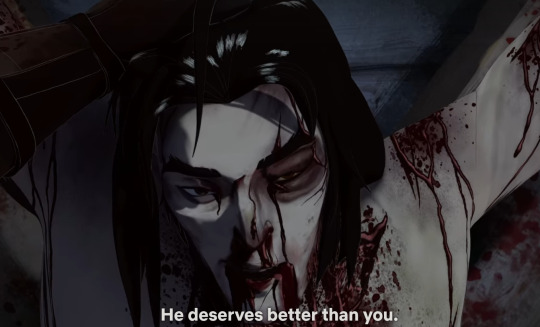
The trigger for his redemption is Mizu. If she had never beat him in that duel, Taigen would live on to become a man like Akemi's father. Cruel, power-hungry, controlling, conservative. But through Mizu, Taigen's sharp edges are ground down, much like water that wears down the stones in a river.
Where Mizu and Akemi's possible love story would be a clash of wills, full of passion and even heartbreak, a possible love story between Mizu and Taigen would be the wearing down of souls. Mizu would make Taigen a better person, and in turn Taigen would dedicate his full respect and support to Mizu as his equal, thus getting her to slowly open up and love herself. Already, Taigen has grown enough to admit (begrudgingly, and in his own Taigen way) that Mizu is better than him; though, clearly, he still has a long way to go, as he still calls Mizu a demon shortly after that.
But basically, Taigen is a very simple man (his main goal now is "to be happy"), and Mizu has great depths that he cannot yet fathom. For this love story to work, it has to begin with Taigen changing for the better. If he succeeds in that, and is able to accept Mizu for all her complexities, I believe that they will make a formidable pair. And though he'd likely still throw a jab or snarky remark at Mizu every now and then, I think he'd come tl wholeheartedly admire Mizu as a brilliant swordsman and a kind soul. Thus, should things work out and this be endgame, Taigen would be able to provide Mizu with what Mikio could not: an idyllic life that is not built on a lie, but mutual trust, respect, admiration, and equality.
Or hey, maybe they could both make their own dojo together! I don't know.
(Edit: This post by @rinandsketches does a great job at delving into Taigen's character and a potential Mizu/Taigen relationship if you'd like to read more about this angle!)
--
Now, as I move on from Taigen, there are a couple more options on how to resolve this love triangle and that includes Option C: Ringo.
In this option, Mizu does not have an endgame romance with either Akemi or Taigen. In this route, she finds peace and love through friendship, solidarity, and a found family between herself, Ringo and Master Eiji—a bunch of outcasts in society who make a strong trifecta of sword-makers.
Also, as an aside while I'm talking about Ringo, I'd like to point out that I believe his element is air and his colour is a neutral grey; he is talkative, easy-going, wise, curious, light on his feet (stealthy) and free-spirited, which are all traits linked to air, and traits that complement Mizu nicely, as he is capable of getting Mizu to open up and trust others again, while Mizu helps him reach his true potential for greatness.
--
And finally, there's Option D: Polyamory.
This is basically an "all of the above" option, in which everyone wins and it's a super duper happy ending. It would also be awesome to get some polyamorous representation, and seeing the dynamic between Akemi/Mizu/Taigen play out would be very entertaining and refreshing. So, you never know, this just might be the true endgame!
--
AAAAND with that, I close my extremely long analysis of what is essentially Mizu's love life. Whatever the final outcome of this love triangle though, I just hope it will be well-written and satisfying to all the characters' respective arcs. (Also I just want Mizu to be HAPPY goddamn it because she deserves the world and her coochie eaten out)
Now, I highly doubt anyone will read any of this (especially not until the end!) but that's fine. I just have so many thoughts and feelings about this show and I just needed to get this out of my system lol! But if by some miracle you did read this far, I wholeheartedly welcome any sharing of thoughts and ideas because man am I obsessed with this show! But of course, if we have an opposing opinions, please be respectful when letting me know; I am very open to friendly discussions.
#blue eye samurai#mizu x taigen#mizu x akemi#mizu blue eye samurai#mizu x akemi x taigen#blue eye samurai meta#also if you ask me PERSONALLY. based on my own analysis which you can read above. personally i'm placing my bets on option b (mizutaigen)#and this is simply bcs i think mizu deserves nice things and that includes getting dicked down and pampered and worshipped#whoops who said that#also mizu deserves to live a life where she can hand taigen's ass to him on a daily basis. ykwim.#BUT i am def open to a change of opinion regarding the mizuakemi rship as the story progresses#i just dont want the writers to reduce akemi into nothing but a love interest for mizu#the only way i can see a happy mizuakemi endgame scenario is if blue eye samurai becomes purely an angsty romance story#in which case then yes i fully endorse the akemi ending <3#but that would probs require a whole genre overhaul? bcs currently the show is firstly an action-epic where the romance is just a subplot#but even tho i dont reeeeally want a mizuakemi endgame i still DEF want mizu & akemi to be romantically and/or sexually involved plsss <3#like they cant have that slow-mo shot between the two of them as their first encounter and NOT DO ANYTHING W IT!!!#also i want mizu to be at LEAST a little sapphic plsplspls#shut up haydar#meta dissertations.pdf#haydar's fandom posts#i wrote this whole thing while delirious and covid positive
405 notes
·
View notes